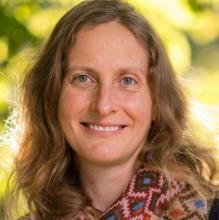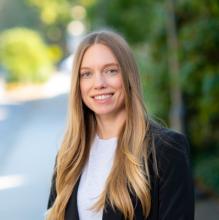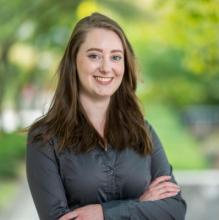In collaboration with the District of North Saanich in Vancouver Island, Tugce's project examines the potential role of green infrastructure in the context of resilience planning to increase coastal adaptation to sea level rise and to reduce losses from coastal flooding.
Research Description
Besides accommodating most of its population, British Columbia’s coasts provide substantial economic, environmental and social services. Yet they are increasingly exposed and vulnerable to changes in the sea level, leading to economic and social impacts. Green infrastructure (e.g., saltmarshes) has been shown to play an important role in reducing vulnerability to coastal hazards. The benefits of green infrastructure depend, however, on factors such as sea level rise, wave exposure, the characteristics of coastal landscapes and coastal land use. My project examines the potential of green infrastructure to reduce losses from coastal flooding in the context of sea-level rise and storm surge, focusing on the Salish Sea region. As part of my project, I work with the District of North Saanich municipal experts and stakeholders, and coordinate a resilience planning project to develop community-specific green infrastructure adaptive scenarios for coastal flooding.
What does being a Public Scholar mean to you?
Being a public scholar means that the stakeholders and the end users I engage throughout my research project can have meaningful and continuous contributions to the different phases of the resilience planning project I am conducting with the District of North Saanich. It means that I don’t simply seek the public opinion on a project or a decision. Rather, it means I listen them and work with them. I design and plan the project with my stakeholders - based on their needs and expectations - and we decide together at the end.
In what ways do you think the PhD experience can be re-imagined with the Public Scholars Initiative?
I think the culture around what a PhD work should look like has been changing. In this change, the roles of initiatives such as Public Scholars Initiative have been crucial. It is important that PSI and other such initiatives keep advocating for non-traditional PhD works, and PSI scholars keep showcasing the important work they have been doing.
How do you envision connecting your PhD work with broader career possibilities?
I believe networking is key to connecting my PhD work with other career possibilities. Throughout my project, I work with various provincial, regional and local government experts and practitioners, as well as NGOs, coastal engineering consultants and environmental law groups. I am building an extensive network of practitioners both in the region and in the broader global academic and non-academic community.
How does your research engage with the larger community and social partners?
Preparedness for climate change, or adaptation to climate change is more meaningful when it is implemented locally. But this does not mean that a community should isolate itself from the larger social, institutional and geographic contexts. In my research with the District of North Saanich, I organized an expert group to discuss the technical aspects of the project. This expert group includes members of the Capital Regional District, Provincial Government, neighboring communities, environmental law groups and NGOs. I believe in addition to finding adaptation solutions to climate change, this project is a learning experience for all participating parties. Resilience planning is a relatively new concept and there is no one-way of doing things. I hope this project – in the end – can provide a knowledge sharing platform for other communities who wishes to do their resilience planning projects and for practitioners who are responsible for climate change actions in general.
Why did you decide to pursue a graduate degree?
As an urban planner, I recognized that to be able to address challenging issues of cities and future developments, I have to be equipped with expertise in other fields such as climate change, ecosystem services and resource management. Therefore, I decided to start my graduate studies in an interdisciplinary program, which would provide valuable theoretical, intellectual and practical learning experience.
Why did you choose to come to British Columbia and study at UBC?
Two main reasons impacted why I chose UBC. First, the RMES (Resource Management and Environmental Studies) program is known to be one of the best interdisciplinary programs in the world. In addition, the RMES faculty members are exceptional academics in their respective fields. A chance to be trained by such qualified academics was very important. Second, I wanted to live in the City of Vancouver and explore British Columbia's unique nature.
I design and plan the project with my stakeholders - based on their needs and expectations - and we decide together".




